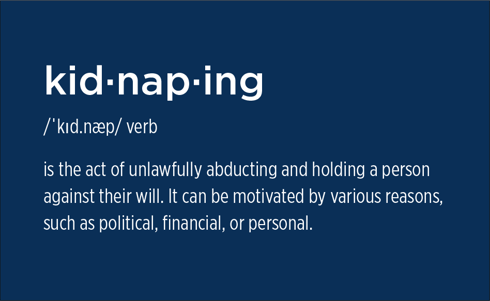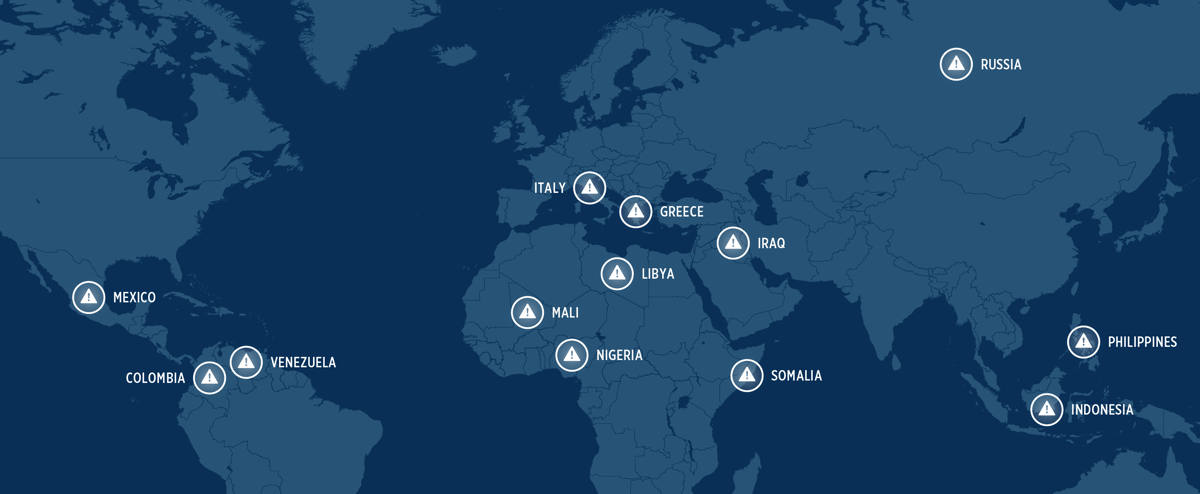
|
May 26, 2023 INSIDE THIS ARTICLE, YOU'LL FIND: |
Kidnap, ransom, and extortion events are some of the most significant security risks that individuals and organizations face in today's global landscape. These crimes can happen anywhere, at anytime — and unfortunately, no one is immune to this threat. Therefore, understanding how to plan for, respond to, and recover from a kidnap and ransom situation is a critical part of any organization’s duty of care program.
While travelers around the world face the possibility of kidnapping, high-profile or high-net-worth individuals without corporate coverage and students traveling internationally are especially at risk of falling victim to these incidents. To minimize the threat of a possible kidnap and ransom situation, organizations charged with protecting their employees or other important individuals should consider the practical insights and guidelines below.
People who often travel for business, especially in global hotspots, should also understand whether kidnap insurance, working with a security provider, or other preemptive solutions are worth considering.
Understanding and defining: kidnap, ransom, and extortion
Kidnap, ransom, and extortion are serious crimes that can cause harm, trauma, and financial losses. Understanding the meaning and implications of these terms is essential for individuals and organizations to develop effective strategies for prevention and response.
 First, to define kidnapping: Kidnapping is the act of unlawfully abducting and holding a person against their will. It can be motivated by various reasons, such as political, financial, or personal.
First, to define kidnapping: Kidnapping is the act of unlawfully abducting and holding a person against their will. It can be motivated by various reasons, such as political, financial, or personal.
Ransom, therefore, is the demand for payment in exchange for the release of the abductee. The ransom amount can vary depending on several factors, such as the profile of the victim, the demand of the kidnappers, and the negotiation skills of the parties involved. Ransom payments can lead to further risks, such as encouraging more kidnappings, funding criminal organizations, and putting the safety of the victim and others at risk.
Finally, extortion is the use of threats or force to obtain money, property, or services from someone. Extortion can happen in various forms, such as blackmail, protection rackets, and cyber attacks.
Kidnap statistics are varied, but the James W. Foley Foundation reports a 580% increase in the number of U.S. Nationals wrongfully held overseas this decade compared to the previous one. With this alarming increase, it's essential to be aware of the implications of kidnap, ransom, and extortion situations and to take preventive measures to reduce the risks of being a victim.
Types of kidnappings to plan for
We know that kidnapping is the act of forcibly taking someone against their will, often for the purpose of demanding ransom or other concessions. That said, there are different types of kidnap and ransom events that individuals and organizations should be aware of, including:
Virtual kidnap |
In a virtual kidnapping, a person is separated from their phone or the ability to make contact with their loved ones (e.g. on an airplane) and the perpetrator uses that time to call a loved one, convinces them that the phone’s owner has been kidnapped, and demands extortion money to free them. |
Express Kidnap |
These are short-term kidnappings that typically last less than 24 hours. In a common scenario, the perpetrators force the victim to visit different ATMs and withdraw as much money as possible for them before being released. |
Wrongful detention |
This occurs when an individual or group is held against their will without any legal justification, often by a local authority. This can happen to individuals usually of a target citizenship and conflict between the two nation states. |
Hijacking |
This is the seizure of a vehicle or vessel while it's in transit, with the intent to hold the passengers and crew hostage or demand a ransom. |
Hostage taking |
This is the act of taking individuals captive with the intent of demanding a ransom, political or military concessions, or other benefits. |
Child abduction |
This refers to the taking of a child under the age of 18 without legal authority or parental permission. |
Hot spots for kidnapping around the world
Kidnap, ransom, and extortion incidents can happen anywhere in the world, but certain areas are known to be at higher risk than others. These hot spots often include countries or regions with high crime rates, political instability, or a history of terrorist activity, and may include:
- The Middle East and North Africa, including Iraq and Libya
- Sub-Saharan Africa, including Nigeria, Somalia, and Mali
- Southeast Asia, including the Philippines and Indonesia
- Russia and the former Soviet republics in Eastern Europe
- Mexico and other parts of Central and South America, including Venezuela and Colombia
- Parts of Europe, including Italy and Greece
Map of Hot Spots for Kidnapping
 Organizations with operations or employees in these regions should take extra precautions to ensure the safety of their people and assets. This may include implementing duty of care programs and security measures such as travel advisories, risk assessments, and emergency response plans. It's also essential to stay up-to-date on local developments and to work with trusted security providers who have experience in these regions.
Organizations with operations or employees in these regions should take extra precautions to ensure the safety of their people and assets. This may include implementing duty of care programs and security measures such as travel advisories, risk assessments, and emergency response plans. It's also essential to stay up-to-date on local developments and to work with trusted security providers who have experience in these regions.
Of course, this can happen anywhere in the world, including within the United States, so no matter where you are or who you’re with, you need to remain aware of your surroundings and have a plan in place to address these types of incidents.
How to plan for a kidnapping and ransom event
Developing a safety plan for potential kidnap scenarios is crucial for both individuals and organizations. This plan should include the following:
- Conducting a risk assessment of potential threats and vulnerabilities.
- Developing a communication plan to ensure quick and effective communication in case of an emergency.
- Installing a crisis management team to oversee the response efforts.
- Developing a travel security plan, including pre-trip planning, on-the-ground security measures, and emergency response procedures.
Establishing a relationship with vetted kidnap and ransom response providers is the best way to have a plan that covers all of these bases. These providers—including people who are experienced in these situations—become an extension of your team, working side-by-side with you and providing critical direction during an active crisis event, making all the difference in the world.
Why kidnap and ransom coverage is crucial
To have the best chance of a successful outcome, you must start correctly from the onset. If you have zero coverage or support, coordinating to get the best help and protection during a KRE incident can be incredibly costly, not to mention disastrous — especially when quick response time matters.
“Between finding an international hostage negotiator quickly, all the costs associated with support and travel, and the amount of time it can take, the price for help will be amazingly high,” says Robert D’Amico, former FBI Deputy Operations Chief of the Hostage Rescue Team. D'Amico has been involved with the successful return of many hostages—most notably with the rescue of Jessica Buchanan in Somali in 2012.
“You want to know the people you have are the best, and can bring this crisis to a successful conclusion.”
There are kidnap and ransom insurance plans that technically cover clients in the event of an attack. That said, not every insurance policy in this space is an optimal solution.
“Insurance dictates most things and is very segmented,” says D’Amico. “It doesn’t provide a team, but tools, some of which may have never worked together before. Most policies will not cover the most dangerous phases, like how the payment is made if they want it in person or how a victim will be picked up for recovery.”
If you're looking for a direct response provider to help you manage these risks, consider a provider like Global Guardian — a vetted, renowned duty of care provider with experience navigating these hostile situations. You’ll know who your responder to these events will be, and that they’ll know how to seamlessly bring every aspect of the rescue together.
What to do if you or someone you know is kidnapped
If you are kidnapped, it's important to stay calm and assess the situation. “Staying calm will not be easy, but you don’t want the bad guys to get excited and make a mistake because that is where you can get hurt,” says D’Amico. “Remember you are a commodity; you have worth to them to keep you alive.”
D’Amico also advises maintaining your humanity, and ensuring your kidnappers keep that in mind as well.
“Staying calm will not be easy, but you don’t want the bad guys to get excited and make a mistake because that is where you can get hurt.”
 “Always make them use your name,” says D’Amico about avoiding dehumanization. “Negotiators always use the victim’s name for that same reason. Try to be friendly and talk to them as much as you can — speak to them about your kids and family. Find something you have in common with them.” Kidnap survivor Jessica Buchanan used this tactic to avoid being assaulted by Somali pirates while being held captive for 93 days, as described during a recent webinar with D'Amico.
“Always make them use your name,” says D’Amico about avoiding dehumanization. “Negotiators always use the victim’s name for that same reason. Try to be friendly and talk to them as much as you can — speak to them about your kids and family. Find something you have in common with them.” Kidnap survivor Jessica Buchanan used this tactic to avoid being assaulted by Somali pirates while being held captive for 93 days, as described during a recent webinar with D'Amico.
Finally, D’Amico recommends trying to leave evidence of your presence somewhere, such as a fingerprint, blood, hair, or your name scratched in something. If an investigation comes across a place where you have been and they find proof, that may help them continue to close the gap.
If you’re working with a security provider to help someone you know who has been kidnapped, they can advise you on and even address certain aspects of the process, including: whether, or how, to contact law enforcement and other relevant authorities; ascertaining proof of life; setting up meetings; maintaining communication while prioritizing safety.
How to deal with ransom and extortion demands
Paying ransom or extortion demands is risky and may not guarantee the safe release of the kidnapped person. It's important to consider the following guidelines when negotiating with kidnappers:
- Work with law enforcement and other relevant authorities to coordinate negotiation efforts.
- Be prepared to determine proof of life to confirm the safety of the victim.
- Establish clear communication channels with the kidnappers and establish a single point of contact for all negotiations.
- Be cautious and consider the potential legal and reputational implications of paying a ransom or extortion demand.
Often, the best way forward is to leave this aspect of things in the hands of professionals with whom you have an established relationship. The best providers handle all aspects of a victim recovery including managing negotiations, liaising with law enforcement agencies, briefing victim families, and coordinating all necessary details.
Using Global Guardian as a security solution
Global Guardian is a trusted duty of care and security provider that offers comprehensive solutions for individuals and organizations seeking to protect their people, assets, and communication both at home and abroad.
Global Guardian’s Kidnap, Ransom, and Extortion membership reimburses all associated costs incurred both during and after the event, and these services can be extended to companies — including employees, relatives of an employee, guests on a company’s premises, and independent contractors — and individuals in need of protection.
With Global Guardian, individuals and organizations have peace of mind with a trusted, effective partner helping them navigate kidnap crises every step of the way, rather than navigating their way through via insurance and local authorities. To learn more, complete the form below or call our 24/7 Operations Center at +1 (703) 566-9463.



